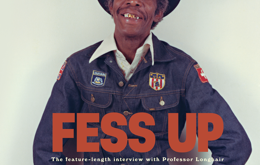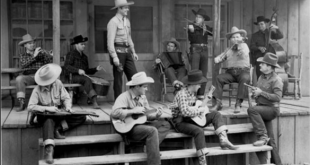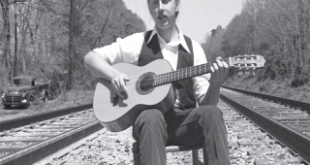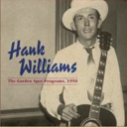 Tales of rediscovered art treasures tend toward Nazi loot stashed in Austrian attics. Less dramatic sagas can still be compelling. Consider one concerning radio transcriptions by an artist dubbed `the hillbilly Shakespeare,’ rescued from a small town florist shop in Oklahoma. At first, the collector who found them couldn’t listen, since radio transcriptions require a special turntable and the one he had was busted. Years passed before he fixed it, put on a disc, and said to himself, “Oh my God, these are live performances of Hank Williams!”
Tales of rediscovered art treasures tend toward Nazi loot stashed in Austrian attics. Less dramatic sagas can still be compelling. Consider one concerning radio transcriptions by an artist dubbed `the hillbilly Shakespeare,’ rescued from a small town florist shop in Oklahoma. At first, the collector who found them couldn’t listen, since radio transcriptions require a special turntable and the one he had was busted. Years passed before he fixed it, put on a disc, and said to himself, “Oh my God, these are live performances of Hank Williams!”
Hank’s daughter, Jett, says, “No one even suspected that these recordings existed.” Biographer Colin Escott admits he was clueless. More than mere footnotes to a legacy, what makes these exceptional among `lost treasures’ is that they offer the sound of a remarkable artist at the peak of his powers. Hank had only recently become a major star, and his precipitous decline was still a couple of years in the future in early 1950. He’s at his most wrenchingly emotional as he sings “At the First Fall of Snow,” and his most earthily funny on “Mind Your Own Business.” These performances may be 64 years old, but the sound is crisp and Hank is mightily `present’ on The Garden Spot Programs, 1950. It’s hard to imagine a more engaging musical discovery than this, released on CD in May by Omnivore Recordings.
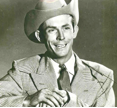 A very different hidden treasure is the musical legacy of Lonnie Johnson: it’s been hiding in plain sight for decades. B.B. King calls him “the most influential guitarist of the 20th century,” and rare is the blues guitarist who isn’t at least indirectly in his debt. Yet somehow Johnson’s impact exceeds his popular reputation. His longevity may have worked against him: Johnson recorded extensively from the 1920s through the 1960s, and in later years played pop standards for bewildered folk-blues fans keen to hear something grittier than “Red Sails in the Sunset.” Liner notes to reissues of his early recordings have `set the record straight,’ and guitar players at least grasp his wide-ranging significance. Recently, Dean Alger penned the first full-length biography-appreciation of Johnson. While it’s hard not to agree with his admiration of Johnson’s music, anyone not already a fan may find it hard to read a book as sprawling as its title: The Original Guitar Hero and the Power of Music: The Legendary Lonnie Johnson, Music and Civil Rights (University of North Texas Press). Alger’s work cries out for a firm editorial hand to shape and focus it into a book that better serves its author’s laudable intent. Anyone wondering if Johnson rates a book would do well to hear his music, much of it both on CD and YouTube, where you can view two superb late performances.
A very different hidden treasure is the musical legacy of Lonnie Johnson: it’s been hiding in plain sight for decades. B.B. King calls him “the most influential guitarist of the 20th century,” and rare is the blues guitarist who isn’t at least indirectly in his debt. Yet somehow Johnson’s impact exceeds his popular reputation. His longevity may have worked against him: Johnson recorded extensively from the 1920s through the 1960s, and in later years played pop standards for bewildered folk-blues fans keen to hear something grittier than “Red Sails in the Sunset.” Liner notes to reissues of his early recordings have `set the record straight,’ and guitar players at least grasp his wide-ranging significance. Recently, Dean Alger penned the first full-length biography-appreciation of Johnson. While it’s hard not to agree with his admiration of Johnson’s music, anyone not already a fan may find it hard to read a book as sprawling as its title: The Original Guitar Hero and the Power of Music: The Legendary Lonnie Johnson, Music and Civil Rights (University of North Texas Press). Alger’s work cries out for a firm editorial hand to shape and focus it into a book that better serves its author’s laudable intent. Anyone wondering if Johnson rates a book would do well to hear his music, much of it both on CD and YouTube, where you can view two superb late performances.
 Baja Review A community newspaper serving Ensenada, Valle de Guadalupe, and Rosarito in Northern Baja California
Baja Review A community newspaper serving Ensenada, Valle de Guadalupe, and Rosarito in Northern Baja California


